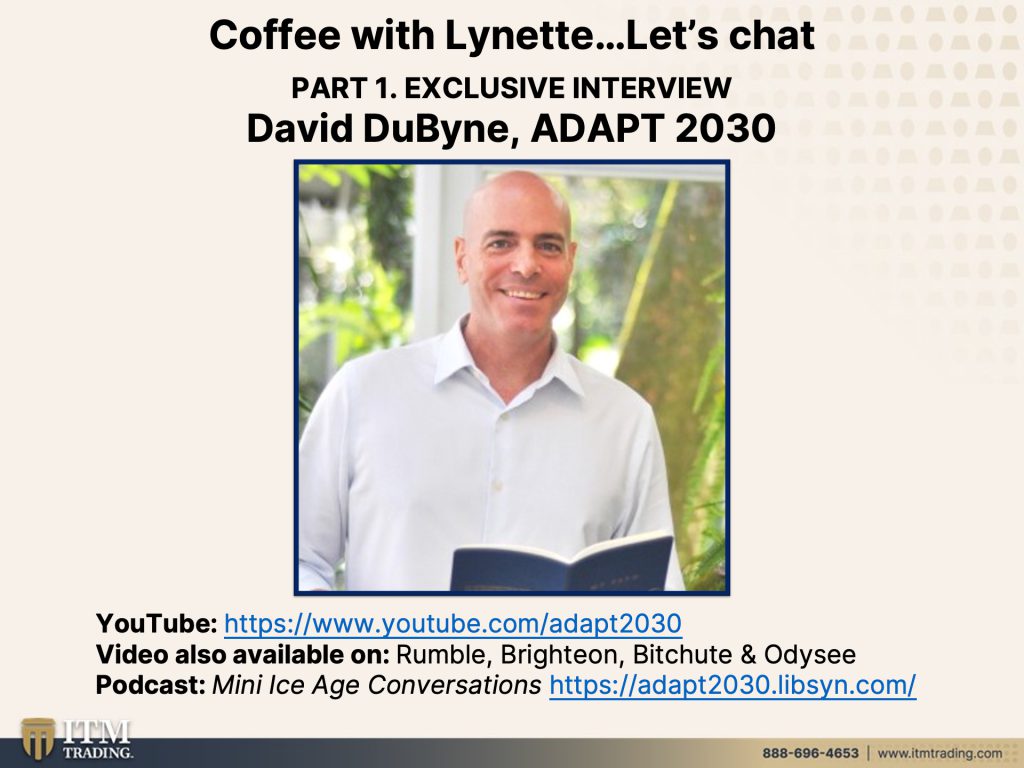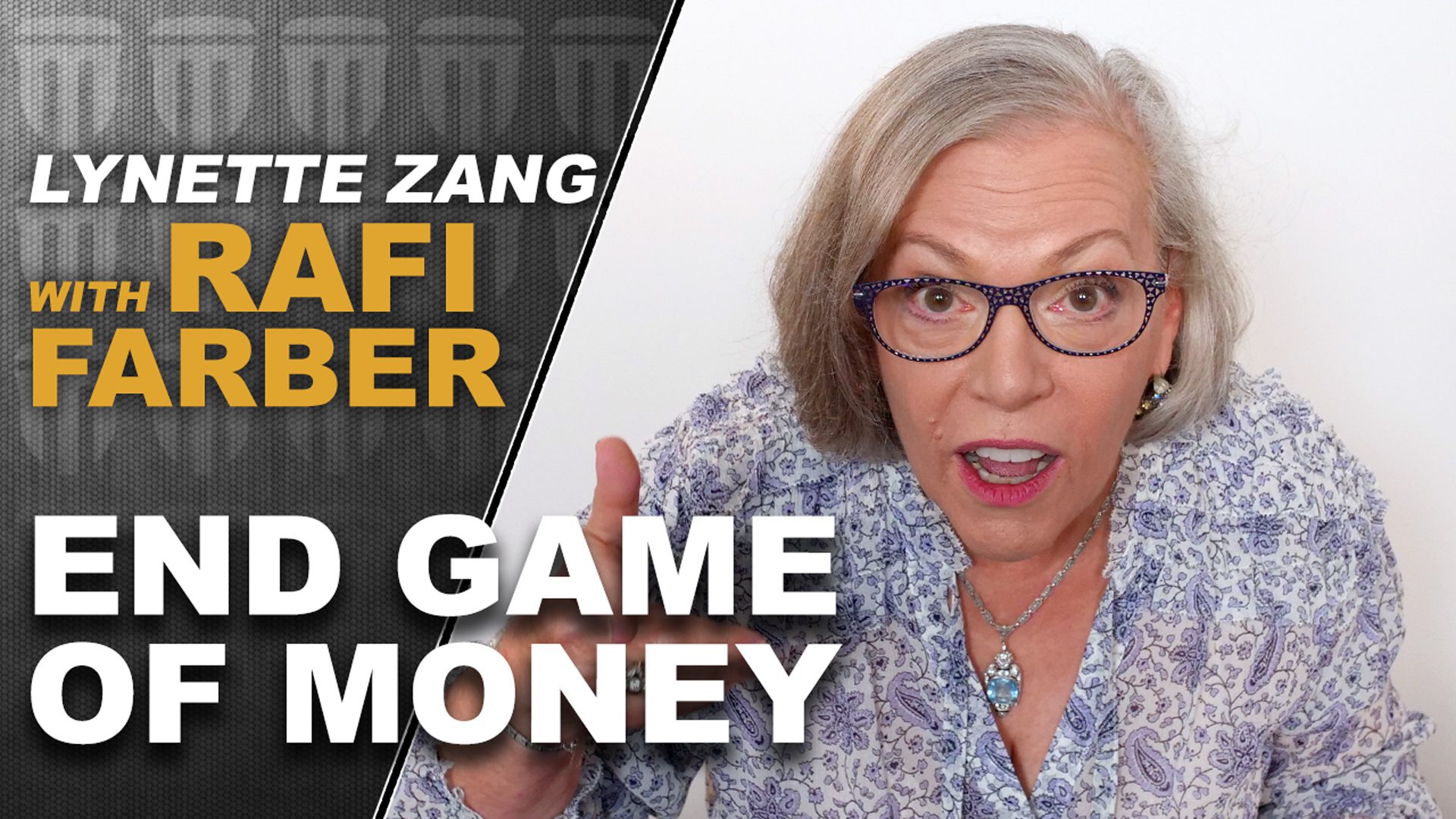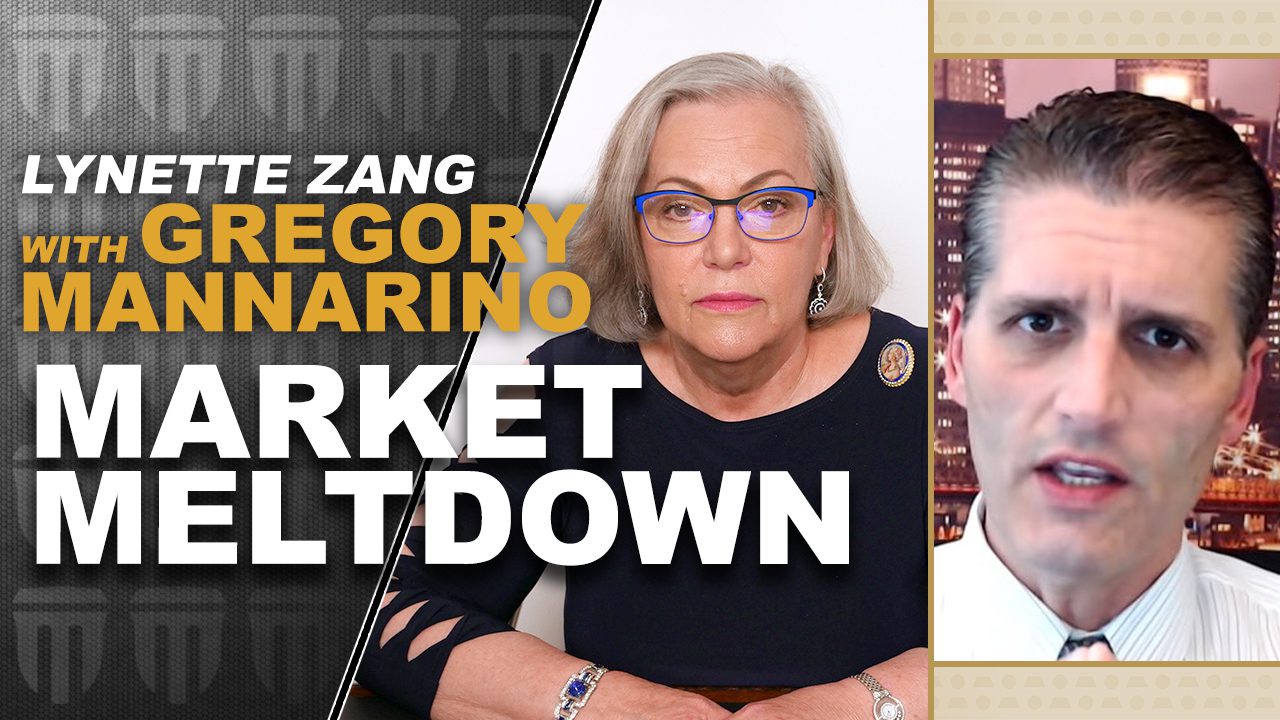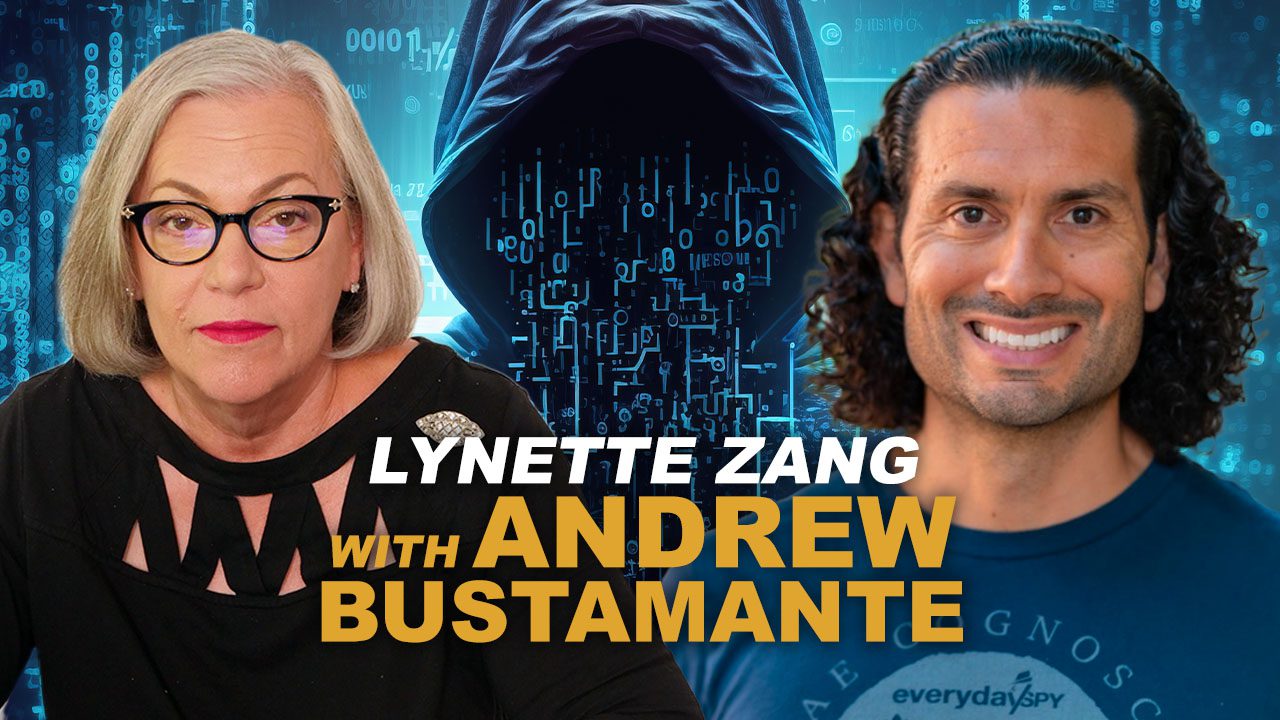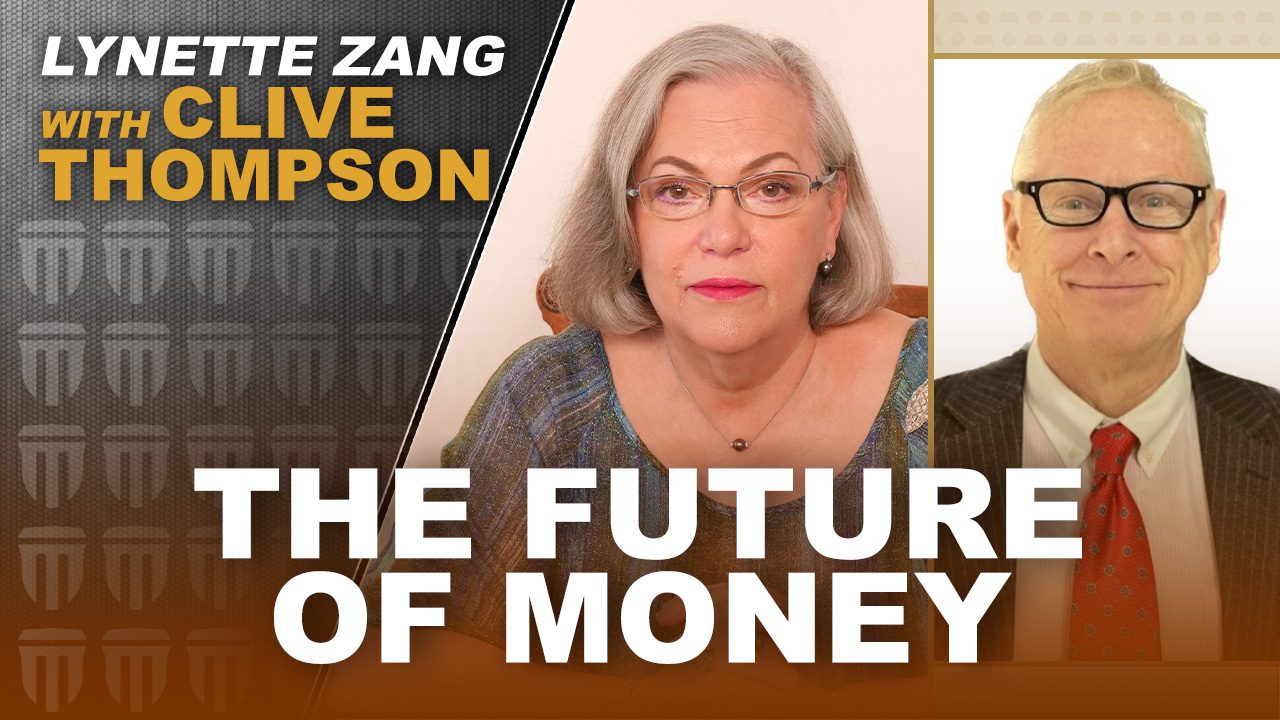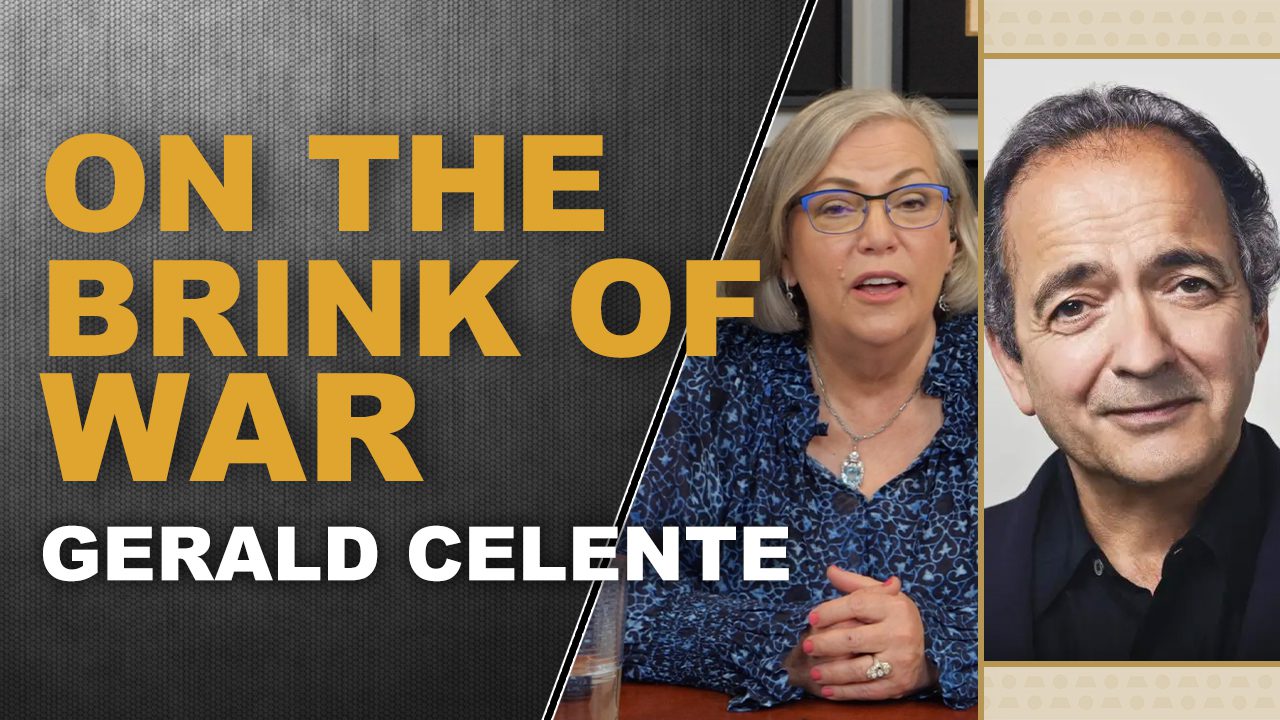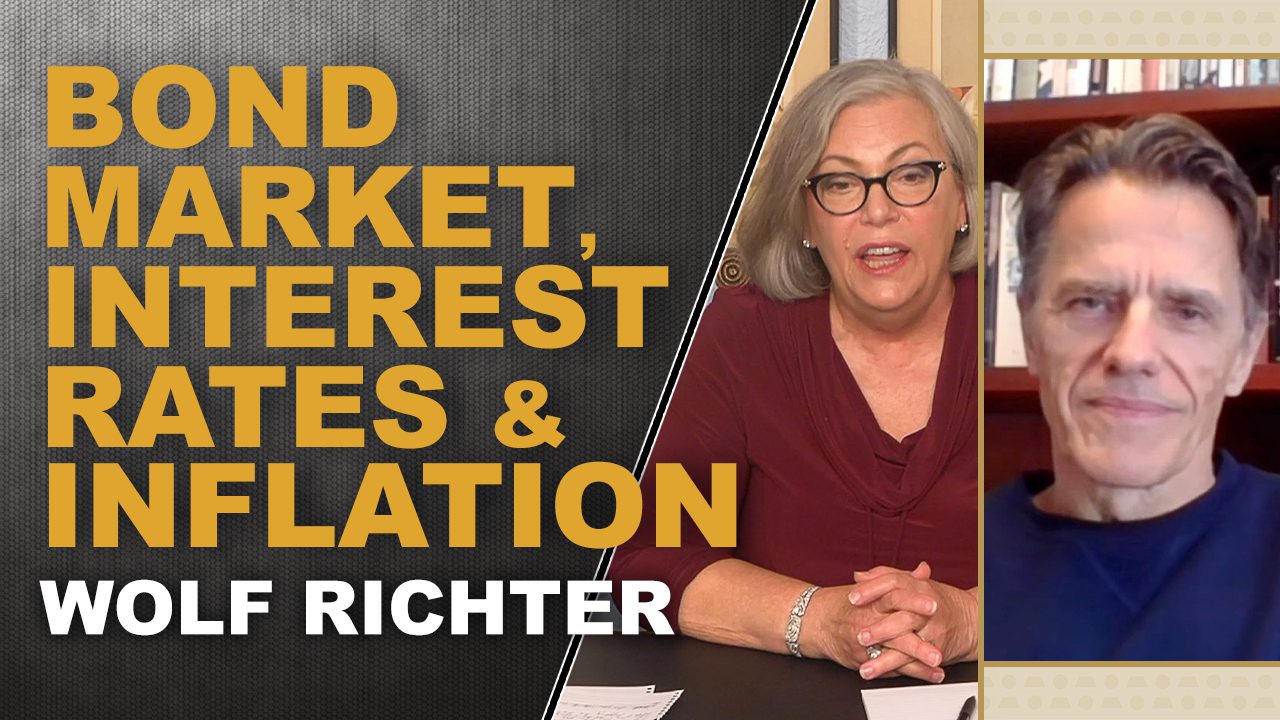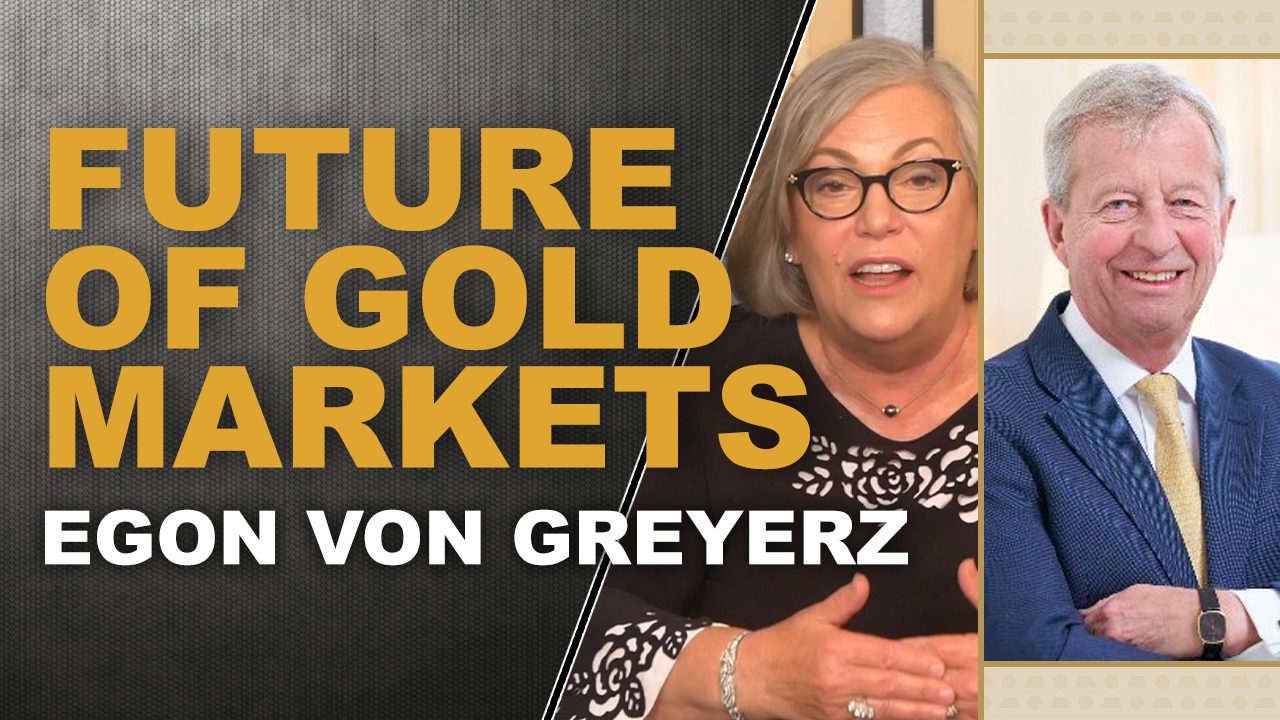[PT. 1] The Problem with Supply Chains & the Food Shortage…David DuByne & Lynette Zang
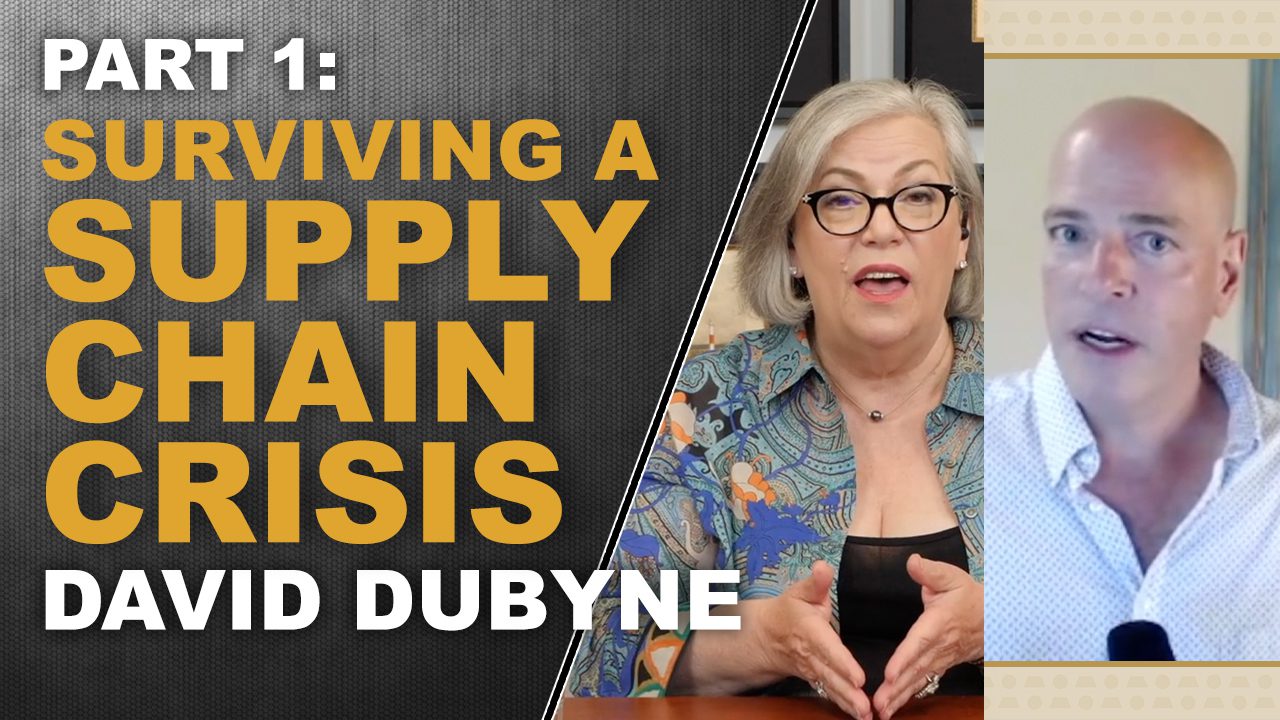
I know you’ve seen the headlines about the food drought we’re about to enter, and it’s coming sooner than you think. The lack of farm inputs are growing but there’s always a way to prepare while we still can. That’s what we’re going to discuss today with David DuByne. He is the second person who I’ve ever interviewed on ‘Coffee with Lynette’. I’ve invited him back onto the show again to discuss some topics that we need to be aware of in terms of surviving and thriving the ‘Great Reset’.
PART 2: Preparing for the Climate Change Crisis & Cooling Cycles ➡️ https://youtu.be/h_dGV_AAQFE
CHAPTERS:
0:00 Overview
1:47 Intro
2:30 Bottlenecks In Production Are Coming
6:45 Analysis of Upcoming Famine
23:13 The Impact of Block Chain on Food Production
40:56 Outro
TRANSCRIPT FROM VIDEO:
Lynette Zang:
Well, you know, you were really instrumental in me doing indoor growth space because I know how deeply you look at your work and I believe you. And I know how deeply I look at my work. And so I also, I believe you from that end as well, but, you know, it seems like the Russia, Ukraine war has been used as, you know, almost a justification for the, for the food drought that we’re entering. Can you talk more about that? You know, cause it’s great to point fingers here and there, but can you really address that for us?
David DuByne:
And at the same time then after if you could jump in because the economy and the food production or lack of farm inputs are running parallel right now, there’s no denying it, that these things are being constructed as whatever control mechanism they’re going in tandem with each other down the tracks here. So, you know, when you and I, we talked, what was it two months ago when I was giving some forecasts here about when we rolled into this point right now at the end of May into the first week of June, that those who are watching economy news, business news, agricultural news would understand that uh oh, there’s not enough seed. There wasn’t enough herbicide. There’s not enough fertilizer and prices are gonna rise exponentially. Now those are generally the people who are already in business or you know, more well to do in the society. If you’re gonna stratify, if you’re gonna strata a hundred percent all the way down that top 20% is generally they understand these cycles. They’re more in depth in tune with these types of you know, business and economy and agriculture, etcetera, cause it all does move together and there’s gonna be some serious awareness arising. Once the numbers get crunched here, coming up at the end of this month into June, they’re gonna know how much corn was planted or not. And then once you start to chase the Daisy chain of corn usage, you’re gonna understand there’s gonna be a huge, huge bottleneck in production of so many things from the ethanols to the animal feed. And then so many byproducts from corn that are used in almost everything that’s in a box in a supermarket. Yeah. I mean the amount of choices are just gonna dry up so quickly and you know, there has to be excuses for this as well. So, you know, when I talked, I said the first, the first check are gonna be three points of time you’re really gonna look for as we move through the summer and into the harvest season. And this is our first marker in time. Here is the awareness of the top 20% of the population with wealth in business that understand the farm inputs weren’t there. And it’s gonna cause a huge you know, tidal wave of unrest in the cities coming into harvest time. So those now that have the means and the understanding are gonna get ready and they have way more money than the bottom part of the society. So when they go to buy and get ready and start prepping out, they’re gonna buy exponentially amounts of goods as well because they can and they are going to, and as we step into the middle of the summer, when they do the crop tours at the end of July and the 1st of August, the rest of the world, the other it’ll take us to about 50% awareness, cause at that point it’s gonna step way beyond business news and press releases from the IMF and press releases from the world bank and the Bank for International Settlements, which is ongoing now which surprised me. Since when we first talked, I said, there’s gonna be some awareness across this kind of news speeds. And here we are the BIS the world bank and IMF all released and all said, there’s gonna be food shortages in less than six months. Which is the exact time of October. That’s the last data point October, the whole world understands and it falls apart at that point, the literally come off and if you didn’t get ready, you’re gonna starve to death or you are gonna get stuck in a government facility trying to beg for help cuz your kids don’t have food. And I’m serious when I say that, I really am. You are going to die. If you don’t get ready in this event here, that’s the plan. The population is going. And I’m not even saying that this many high level people and institutions, can’t all be rolling in the same thing. Like we don’t have enough of this. There’s more fires here. We’re bottleneck in here, the railroads aren’t delivering here. It’s all institutions working together that are stopping the flow of everything right now, especially focused on food. And I’ll stop before I go on a rant there.
Lynette Zang:
Well actually I like your rant so you can keep going on that rant. But I’m wondering if they’ve been using the shelf shortages, like somebody made a comment to me the other day. And I thought it was really interesting that this younger generation is now used to empty grocery store shelves, which I don’t really think that’s true, but that was their perception on it. What’s your, the perception on it? Because we’ve had empty grocery store shelves since 2020, then they haven’t recouped and it’s gonna get worse. I believe you. So I I’m prepared. I’ve been prepping for a long time and I’m, I’m grateful to you because all of the preparations that I’m doing up north is all covered so that we can control that.
David DuByne:
Yeah, you can control what you have access to at your fingertips. Outside that control there are levers and gears being shut down behind the scenes. And I’m very firm belief that these elitist have used some sort of algorithm or programs to game out what happens when you shut down a, a certain supply chain and what the knock on effects is. And they’ve also gained out human response and emotion to effects and stimuli. So if you have those two, all right, if we cut the fertilizer here, that’ll cause a a 20% decline here. And by the way, Brazil, another one, they just said that they’re only gonna be applying 75% of the average fertilizer application to their crops. Mm-Hmm <affirmative> and you know, I’d done some research and talked to a lot of people. It’s a one for one. So anybody doing the math out there, it’s a simple one to one with herbicide applications and fertilizer application. If you reduce 1% of your application on fertilizer, you reduce your yield 1%. So Brazil publicly coming out last week and saying, we are reducing fertilizer application 25%, they’re a huge swing producer, huge. And they’re gonna be losing at least 25% of their crops. I’m not even talking about the herbicide applications in addition to the fertilizer shortages.
Lynette Zang:
So let’s take it down to like just a really personal level with this because I put in ponds and I am up up north as well, putting in ponds to generate the fertilizer so that I’m not dependent upon manufactured fertilizer. And you know, so therefore I can kind of, I think I can avoid that, but so is that what you recommend, is that what you’re doing for yourself? I mean, how are you preparing for yourself with this lack of fertilizer?
David DuByne:
Well, since I have a registered farm, I’ve been able to buy, several tons, to sit by and put back in the, in the storehouse there at the same time, learning about producing natural fertilizers now. So here’s the thing we’re gonna get bottlenecked in squeeze to the most duress and loss and upsetting of society for about a year period. Only at that point, most people will work it out on how to get fertilizer inputs, how to grow the food. It’s gonna be this first year of unpreparedness for most people, but as next year and people have starved and they watch people die from hunger and turned away hungry families from their door that they may need to fight with later because those families know there’s food inside. And then my hungry children and my hungry wife, and we’re getting your food are getting the food. You’re not gonna deny us. And this is the scariest thing that you’re gonna get that they’re not gonna walk away and go hungry and let their kids starve. But if you’re the only house that has food now, it’s, it’s gonna be a year process, just like they did. Who was I? I was talking to Clive De Carle over in the UK and he was talking about peak oil in Cuba. Now, right after the Russia or Russia, at that point the USSR stopped supplying Cuba with oil. They had about a 12 week lead time. So what they did is they started ripping up the streets and going into full organic production the best they knew how at the time, but, and then the subsequent next year, it wasn’t nearly as bad because people were composting. People were saving what was thrown away. Then mm-hmm, <affirmative>, you know, when you see leaves, fall off the tree, this next year, you’re gonna be diving on the leave, those are mine I need ’em for compost, right? So it’s gonna be this one year of complete upset and ripping apart of the threads of society. But I do believe people will put it back together once they realize how to make their own fertilizers. And please check out this one, it’s called JADAM, JADAM. There’s a huge amount of research in Korea on how to make fertilizers out of anything around your forest or around your farm or around your house.
Lynette Zang:
Oh, that’s good we definitely need that one.
David DuByne:
Yeah, it’s the best book I’ve read on it. And it’s how to step-bY-step by step. They also have a herbicide JDAM and then also pesticide JDAM course. So you can do everything pretty naturally there. Right? But I do believe the fertilizers, everybody will come over that at the end of the year, once they realize what happened and seeds, people are gonna start growing seeds, like we did start saving seeds mm-hmm <affirmative>. And my research has taken me into the victory gardens of the 1940s with World War II. And we grew 40% of all the food in America in people’s backyards during the wartime effort. Yep. And then so quickly how after the war was over, the government had pushed to everybody go back to the supermarkets. Look how full they are. There’s no more ration cards. Please go back to the supermarkets support America’s economy again, go buy the butter from the store. Don’t grow any vegetables at your house. We need the farmers to make money, to make America strong again. So just don’t and literally stopped within like six months, the very following year, it went from 40% production down to 10%. That was a super vast, incredible drop. Cause the war ever had ended. Yeah. And right after the victory garden ceased, it was the following year, 1947, the amount of production from 1945 to the amount of 1947 on victory gardens, everybody was shopping in the supermarkets again.
Lynette Zang:
We have short memories.
David DuByne:
And where we sit today, everybody forgot super short memory, incredible short memory. We could have kept that system going, you know, for the last 70 years from the end of that. And we could’ve, definitely increased that from 40 to 60 to nearly a hundred percent. But then you come back, there’s no corporate control. And I wanna say one last thing Lynette and then I want to really see, what you think about the economy moving in tandem through the end of the year here. And I know you don’t call, you’re not specific on the months or the dates or something, but I’m very specific saying October, the world’s gonna shred itself here when people are really scared about the food and there’s gonna be fighting and they’ll have to put troops around in the stores and it’s gonna get really unwound here at the end of the year. But I don’t know. I was gonna say something and I forgot, but please continue. I could probably come back to me.
Lynette Zang:
That’s okay. We get really passionate, but you know, know yes. If it seems to me and I can see things that are really heating up and we’re being driven from crisis to crisis to crisis, which keeps us off balance and really not knowing what to do. But you know, when you look at all of the data, I agree with you a hundred percent. And in fact, in, in June we’re doing the George Gammon event in Miami, and we’re getting to go to Vizcaya and the victory garden, which fed I think 40% of the population in Miami during the great depression and then also probably in the war and they have it closed now, but we’re gonna have a special tour there. And that’s much, much of the reason why I actually grew outside my backyard was for people that are hungry and hopeless, hopefully they won’t destroy the plants. Hopefully they’ll be smart enough to recognize that this is food and they can come back every day and find some thing that is, you know, blooming and ready to eat because that’s what I’ve been doing. But there’s a huge parallel. And, and even, you know, let me take this one step further with the food, the way that they went into mass production of the food with all the chemicals and really just depleting the nutrition of the soil, because it really is all about the soil. You’ve gotta have rich soil and good water, but it really is about dumbing down America, because if you’re not eating really clean nutritionally, dense food, you can’t think as clearly. And if you can’t think as clearly, well then you go along with things a whole lot easier. I mean, it is much easier not to pay attention, but I, of any of this doesn’t make you immune it just leave you vulnerable. And yes, I see a tremendous amount of parallels through the end of this year. For me, 2022 is always economically a very pivotal year because presumably in 2023, they have to shift. Basically almost every financial contract out there from one interest rate benchmark to a different interest rate benchmark. And I don’t think they can do it. And when they tested it, it was a big fat fail. So, you know, I know I have sped up things that I was planning on doing, you know, next year and getting it done this year. I did the same thing last year. Things that I were planning on doing this year, because I can see a collapse. I can see it really close.
David DuByne:
Well, let me ask you on the, on the switch over on the rates there mm-hmm, <affirmative>, they’re still trying to switch the rates from one system ’em while there’s still two working systems together they’re trying to initiate a new system while they’re still an old system chugging along here, maybe what if they were to collapse the old system completely and then just restart under the new system? Does that make sense?
Lynette Zang:
Yes, that’s what I’m saying. That’s why I said maybe because we always make the assumption that they want this to go on, but when you’re at the very end and you know it, do you really want it to keep going on? No, it can’t. It can’t. And the debt bubble has already been pricked and they have to raise rates to maintain their credibility, which helps them maintain control. And they’re losing that credibility pretty rapidly. So yeah, this other system it’s, it’s not working yet. The Libor and, and the way the SOFR responds to it is very different. So the whole system is built on the LIBOR, but they wanna switch it to the sofa. And the reason why they were not getting the markets to cooperate, cause they’ve tried to make this transition for a while is because these two rates don’t behave the same way. And it re-prices every single contract out there that’s issued against the LIBOR and has to shift into the SOFR and that’ll collapse the system. They say that they’re not ready with the new system yet. In other words, the CBDCs. But I don’t know if that’s true or not, because why would the Fed issue FedNow accounts to everybody in the U.S.? So prematurely, it just doesn’t make sense. If, if they weren’t ready to push a button and insert those CBDC’s, programmable money.
David DuByne:
Well, if they came out clean and said, we have it, we’re ready for it. People are gonna say, well, we want some oversight to see how this thing operates. Instead of just coming out of the blue, like bam, it’s ready. Oh, there’s a collapse right now. Oh, it’s already ready. Oh, that’s perfect timing, it was just coincidental, it’s already ready. Wow. We can save you. You won’t starve if you get the CBDC. Oh, by the way, your digital rationing cards on the same app with that, you can hold your vaccine passport on the digital facial recognition. So happy Tuesday. Everything’s sinking up and wow. Isn’t it. A beautiful world. We just saved you again, centralization work. Didn’t it?
Lynette Zang:
Yeah. No,
David DuByne:
Please rely on us again.
Lynette Zang:
Yeah. Please rely on us again. Please just do what we say and not what we do, right? I mean, you look at what’s happening with the spot gold market and the spot silver get. That’s the only asset that hasn’t been inflated, but Hey, they raise those interest rates on those bonds. Now you have something that pays you interest. Of course the currency is worthless against gold. That doesn’t pay you interest, but it’s used across every sector of the global economy. Okay. What’s that worth?
David DuByne:
Quite a bit more, hopefully one or two ounces of silver to pay off my farm and during the hyperinflation event or yeah, I’d be even happy if a kilo of silver paid off my farm during the hyperinflation event. And then I could acquire a couple other pieces of land that got foreclosed on and then allow the people to still live there. See that’s whole thing. Cause I was reading some things about in the great depression and they had what they called the penny auctions going on mm-hmm <affirmative> where the banks would confiscate the homes and they would try to re auction them. And then the local people would show up and then they would buy their farms back cheaper. But at the same time, if somebody really couldn’t afford it, people would buy their land and just let ’em stay there and still work on the farm and then have the community still growing food for each other. And I would really like that concept. Cause if I had the means to do it and stop a family from getting evicted off their farmland, I would absolutely buy and say, you’re welcome to stay here and live here. Just, you know, security and keep the food coming and you know, help other people along, cause we’re all gonna need that. You can’t be kicking people off their farmlands during this time. I mean, that is gonna be a great disruption. If people are removed off their farms at the small scale.
Lynette Zang:
Right, but you know.
David DuByne:
I’m sorry, Lynette, like agribusiness can’t come in here and start taking these 20 acres and the 12 acres down the road and the 16 acres over here. I mean they would have to connect them all the way through and then they would still only get a hundred acres and they’re not gonna run big machines out here for a couple hundred acres. They want the 10,000 acre plots.
Lynette Zang:
But there’s been this trend over the last number of years where, where like, you know, look, it’s, it’s been the corporatization financialization of every single asset, unfortunately, including farmland. And they’ve really been pushing the small farmers out because guess what? Small farmers have to actually like make a profit to be able to stay in business. And they’ve really been pushing. I’ve seen that a lot here in Arizona where they’ve been push the small farmers out and corporations have been taking over the farms. So what’s your feeling on that? And what’s what have you seen?
David DuByne:
Well, I suggest everybody to watch. If you have an extra hour and 10 minutes, a documentary called King Corn. This just lays it out. I don’t know if you’ve seen, have you, you seen that Lynette that in the documentary?
Lynette Zang:
I haven’t seen the documentary, but I did see that you just talked about that recently. So I intended to watch it, but I haven’t yet.
David DuByne:
But I, what goes into the whole subsidy program on what the government matches. And then if you don’t get any government subsidies from your farm, you literally you can’t, you lose money on every acre. Exactly. It’s really impossible. Impossible to make money at the going rates at what you would be paid without getting government help. And then again, it’s another mechanism of control because when the USDA oh, you can’t grow this, you have to certify that. And there’s a complete, you know, pipeline of control of where your food goes. Mm-Hmm, <affirmative> what your cows do, where the milk you are 100% controlled at that point by them. And you have no other option, but some of the bigger farmers are super happy cuz they’re getting, you know, hundreds of thousands of dollars in stipends and different things. And they just run their big tractors and one big, and one thing about that was, you know, they were saying, this is a little bit, this 10 years ago, this documentary. So they’re like, we like to buy out the small farmers cause they make it difficult. We have to turn our tractors more. If we can buy their farm and we just bulldoze their house, then we don’t have to turn our tractors around as much we can, we can plant and seed and you know, do maintenance on the field much faster. If we don’t have to turn our machines around their homes so much. And I was like, you gotta be kidding me. Oh you gotta be. I sat there. I just put it on pause. I go, you gotta be kidding me.
Lynette Zang:
Well, you know, that brings up something else, something that you said just triggered this thought to me. And that’s the blockchain because if there’s this whole chain of custody, isn’t there that whole chain of control. And I can see the good in knowing that where you got the lettuce that had salmonella, that is certainly an important thing to know where that came from. But can you see how those, how the blockchain can have an impact on the food production in, you know, maybe not such a great way.
David DuByne:
It could, especially if it’s based on your digital rationing car, that limits the amount that you can purchase. And also, you know, they’re gonna be using maybe digital ledger like a DLT settlement for your digital rationing card, cause one equals one swipe at the end of the day and then all that out. So the next time you go in even a minute later, it’ll be real time almost cause I think DLT can. I think they’re what at five seconds on the clearing now to settle everything. So within five seconds, unless you step back in line and within five seconds revise something again. And so I’ve seen a lot of different ideas on what they’re gonna go with digital rationing cards, but it definitely is a hundred percent going to be on the blockchain. It’s gonna be blockchain based. So again, they trace back your purchases, your point of purchase, how much you’re purchased and it’ll be a complete record of everything you have purchased. And if you’re trying to get a family member to go in and instead of you and the facial recognition thing, I mean, you know, before you could have your kid run down there and oh, take the card with you in the 1940s, oh, excuse me. In the 1940s, they used to you know, have the children go run and do everything. Right? But now, you know, you can’t do that anymore. You yourself have to be there and scan your thing and, and then blockchain and then QR code it and before you can get it. So there’s gonna be a lot of hoops and hurdles to get through this time to get the food allocated to you or your family. What if you’re sick and you literally can’t go? You can’t get somebody else to buy the food for you because it’s not your face to unlock the phone for your personal, like you were talking personal individual accounts from the fed, FedNow. I can’t share your account. My parents can’t share my account. It, you know, it’s your account only. So when you go into the store for, you know, your purchases, you physically need to be there. And unless they’re gonna be able to do it where you can order online somehow and still scan the QR codes and what not. But they always give you the worst of stuff if you’re gonna order online. So, you know, and let me tell you a little story here. The Amish have been harassed by the USDA over here. They used to, they still do. They sold eggs, but the USDA inspectors came in and told them, you’re not registered. You can’t, you didn’t do this. You don’t wash your eggs. You’re not allowed to sell them. You’re not allowed to advertise ’em or anything. So they’re under the counter and you go, Hey, you got any eggs, you got any, is that I could buy? And they’re like, yeah, let me get those. It’s almost like they’re drug dealers now. And it’s crazy. Because the Amish have far better quality than anything you could get in a supermarket
Lynette Zang:
A hundred percent.
David DuByne:
Yeah. And I could not believe that they’re being harassed by the USDA and it comes down to the vegetables too, but it was all about the sheep, the goat and the eggs and they’re grass fed. I mean, they love those animals. They treat them so well. And they’re, you know, there’s no chemical around there. And the guy in town who has a restaurant, I was telling him, you know, we got the most amazing lamb from the Amish. They slaughtered it. We butchered it. And, and he was asking about, you know, taste. And so I was like, eh, we can bring a couple low or something. If you want to try him. He’s like, oh, not in the restaurant. Can’t bring it anything in the restaurant. That’s not from the USDA with the blue ink or the, the blueberry ink on it. So even in the local town, four miles away from the Amish farm, three miles away, they can’t even go there and purchase an animal that was grass fed on the Amish farm to go then serve in the restaurant, because anything in the restaurant sphere has to specifically come through that chain of custody. And it’s just bizarre how it all works, that you can get better foods, but you’re not allowed to serve them because they weren’t inspected first through a what do you call it? Expert or something.
Lynette Zang:
It’s pretty, you know, it really is about, it really is about the financialization of the whole world and the quality that you get once the corporations are in charge and it doesn’t matter, it could be medical care, dental, care, food, you know, water, everything, you know, real estate, everything has been turned by these corporations into financial products and then leveraged like crazy. So debt upon debt upon debt upon debt, which now that whole piece is it’s a house of cards that’s ready to come down. And I, you know, I mean, I wonder what do you think all of this is really leading up to?
David DuByne:
Well, you triggered that thought that I forgot early in their conversation when I said, oh, I forgot what I was gonna say. Good. the COVID wiped out all small businesses, so there’s no other opportunity for you to buy anything. So everything’s being really under corporate control. Now there’s very little, that’s not under corporate control. And for these grand plans of the world economic forum and all the, you know, banking institutions across the world for it to work, all corporations have to be involved and March lockstep for the desired goal at the end. So if you had 50 other places to shop and your supermarket ran out of food, whoop dee doo, I’m gonna go to the Asian market. I’m gonna go to the Indian market. I’m gonna go to the Amish. I’m gonna go down wherever the mom and pop ABC store on the corner. Those have all been pretty much wiped out. They’re gone now COVID did one thing. It reduced small business down to a mere trickle. And any of those that survived or at the very bottom of the food chain of deliveries, you know, they go without all the time and Walmart. I’ve got a little information on Walmart. Somebody who was a buyer that got fired from their job. They closed one of the Walmarts and weird that my friend knew, knew her and knew I was into that kind of supply of chain stuff o before they closed down that Walmart, she told him that after six months there’s gonna be nothing left. That’s why they’re closing the stores. Now the Walmarts are closing, so, oh, wow. You know, there’s a whole bunch of thing. Well, they’re gonna close it and dig underground or so I don’t know what that’s all about, but the thing is, the Walmarts are being closed because after six months, there’s really nothing else in the chain. After that, and me living in China, working there, I understand the names of the ports and like what’s going on in these specific regions. Mm-Hmm <affirmative> with the lockdowns in Shanghai. I follow a lot of telegram groups that have that smuggled videos that get out of there and locking people in their homes, etcetera. But the whole thing now, with Beijing locking down, they’re gonna be locking down Tianjin port, which is the next largest. If you go to, if you start up at the top right up near the Korean border, then you committed Quingdao, and then you get little further south and you committed Tianjin. And then you come down to the big ones, like, like Shanghai, Ningbo. And then if you go up the Esther up, the, you know, tributaries up there, you can come up into Hangzhou and Suzhou. Like those are all closed. All of them, they got 13,000 ships awaiting offshore there. And then if you go down to the Pearl river Delta down there in Guangzhou down near Hong Kong, Hong Kong’s been a mess for years off the protest and installing a new government before 19, you know, there were years, decades in advance of installing the puppets, but everywhere you look like that whole Pearl river Delta Guangzhou, and that whole area has been just at a trickle since COVID began. Anyway, it never returned to its volume of containers. And, you know, everywhere you look shut down, shut down, shut down, shut down. It is a wall of no goods are coming now, just please under understand that too.
Lynette Zang:
Right.
David DuByne:
Things for repair parts aren’t coming anymore. So whatever’s in there. And then that was validated by somebody from that secondhand story from a Walmart buyer was nothing’s coming after six months, that’s October. It all matches up. I can’t believe succinctly. It says that that, that then the next layer of cake keeps coming on, but the same slice mark on it. It’s crazy.
Lynette Zang:
That is really crazy.
David DuByne:
It’s interesting.
Lynette Zang:
Well, let, let me ask you, since you lived in China for so long with all of these lock lockdowns, what do you think the real point is? I mean, do you really think it’s about getting rid of COVID or do you think it’s about something else?
David DuByne:
It’s definitely not about COVID, I’ll go on the record and say that there’s a couple options to look at there. Political, you could say that I won’t go too deep into it. But at, at the very least to cut off all the maintenance, repair operations and all the repair parts for all of our machinery in the states. So if anything breaks, we can’t use it like there’s stories, a million dollar combine sitting on the field cause they can’t get a new rim off. And the tire it so off because it came from China and all that type of repair part that was existing in the U.S. Has been used up. So now they’re starting to cannibalize machines and machinery and you got a million that’s just startling that you got a million dollar combine sitting in the field that can’t get repaired. And you know, if you do stop the trickle of goods down to literally zero, then if you can’t repair it, then what? Literally then what?
Lynette Zang:
Exactly, do you have an answer for that?
David DuByne:
Tanks and artillery and all type of, you know, how much stuff was manufactured over there for our military it’s startling that we would put in the Chinese hands, our repair parts for our own military. It’s startling that that happened. And that was just for me, that was the last straw. I’m like, this is definitely happening on purpose. Once I realized that the shutdowns in the non shipping deliveries from China also included military vehicle and some armamament repair parts and also some higher tech things from some of our fighters in China manufactured, are you insane?
David DuByne:
Wow, that’s what’s happened. And once all this hits to the head where the low harvest come in, in October, everybody’s gonna realize, but then we’re not gonna have anything to really repair the cars, the automobiles, whatever it might be factory parts, conveyor belts, anything. And then what, then we’re gonna be a broken down country with nothing going, not hardly anything moving. Shoot, I talked to some guys up at the railroad and some grain buyers out in California that are in the dairy industry, told me that they are so limited on cruising teams on the railroads right now. Heaven forbid trying to get anything repaired that the crews are the people who drive the trains, but the teams are the ones who assemble the trains, make sure the right car goes on a destination point, load it up, make sure all the cars are connected, do all the safety checks and all this stuff. They don’t even have enough staff to run it base level right now. And that’s why you see BNSF, also cutting fertilizer shipments, and a huge amount of other things that are not gonna be delivered by rail or extremely curtailed. So it all starts to fit in it’s corporate control again again, again, again again, everywhere you look, it’s a corporate breakdown, it’s a corporate breakdown. It’s a corporate supply chain. It’s a, it’s just it’s happening on purpose. I sound like a broken record now.
Lynette Zang:
Well, you know what? You need to sound like a broken record because this has been evolving for a really long time. And so if the corporations are controlling everything and you want something and you get desperate enough, then I guess you go along with anything they tell you to do, don’t you?
David DuByne:
You do. And that’s again, a day digital rationing card. I there’s so many things people are gonna have to do to get that. They’re gonna probably require double vaccination to get your digital rationing card. You know, they’ve been pushing the vaccine thing for so long and then it kind of fell off and, you know, the max thing that, but then again, it’s starting to bubble back to the surface again. And when it really comes push to shove and the cool and flu season comes back again, you want your food, you need to get vaxxed. And that’s the scariest thing too, is how they’re gonna push that. And Lynette, I really didn’t answer your question about China, but I think de population of political enemies and a war with the United States to weaken us so far, that it there’d almost be no resistance. By the time we got here would be emaciated with no food and we have no repair parts and all of our machinery and different things couldn’t even put up a fight, cause it wouldn’t run. Wow. That’s where I think we’re going with it. You know, it’s a long played out thing though. Chinese, they game everything out for a hundred years, this whole four year thing…And they’re just laughing right now. How it’s in a, it’s probably a perfect synchronicity. They’ve been planning this since the 1950s, they still got 30 years to go on the hundred year plan from the fifties come on.
Lynette Zang:
Yeah. But there, there was just an article that just came out the other day and I’m not gonna get who said it, but it was somebody that was high up in the Chinese government. And basically they were telling us to prepare for war. And that was like, wow. And you see these days, you see all of these headlines about doing away with the dollar as the world reserve currency. I mean, in my entire career, I haven’t seen this so often. So you think this is a transfer of power?
David DuByne:
I don’t know. You’re that’s your wheelhouse understanding the dollar and the, the ditching of the dollar for a slang term there. So what do you think, do you really like, and percentage wise, how many countries have gotten off the dollar at a hundred percent. They don’t use it at all. And how many are sort of, you know, in that, you know, switching mode between getting some Chinese Yuan in as settlement instrument, and then also keeping some dollars for other things, and there’s sort of this, you know, mix and match going on where before it was a hundred percent dollar or you were invaded and your government was overthrown and we put our puppets in there to make sure you use the dollar. But now that doesn’t seem to be the way it is anymore.
Lynette Zang:
No, but that’s been transitioning really that started transitioning back in 99. So this is, and again, it happens slowly so that you don’t notice it, but we’re at the end here and countries, most countries still do hold a level of dollars, but that has been declining over time. And I think that we, and with all of the rhetoric now about the U.S., You know, living without the dollar or the systems that can go around the SWIFT, which is the U.S. System, etcetera, really what’s happening in so many ways is that we’re using that advantage of the world reserve currency. And that means that the, I think the hyperinflation is going to be worse. Here almost than any other place, because we have a lot more to lose. We have a lot further to fall.
David DuByne:
When you say hyperinflation, what price would you be talking about for a pack of seeds? Okay. Right now you can get anything from 99 cents for a pack of seeds with, you know, a small little countryside brand here or the mainly a regional end, or you can get all the way to super heirloom it’s 4 99 a pack. Okay. So we’ll say a dollar to $5 on a pack of seeds. So this hyperinflation event, what are you talking about for a pack of seeds in the future after this all unfolds? Are you talking about $10, a hundred?
Lynette Zang:
I would think, you know, probably like a hundred dollars and more because of the loss of value. I mean, look, we don’t have very much value in there and the only thing of the dollar now, and the only thing that’s kind of holding it together is that people can’t imagine that the dollar could go away even as it’s going away, but since that’s happening. So, you know, if you look at the trend line of the loss of purchasing power officially on the Fred, what you see is a massive drop off. So a pattern and shift change that I do think that we are already in the beginning stages of the hyperinflation, even though it’ll have, you know, we haven’t hit 50% yet, but you know, I love how all of the, those guys in power that say, yeah, it’s gonna be bad, but then it’s gonna peak. And it’s gonna come to out next year and look at all the headlines. And how many times they’ve been surprised by the level of inflation or they’ve been surprised by this. You’ve been surprised by, so these are the guys that you’re gonna listen to to tell you? No, so yeah, I mean, we’re, I think we’re, I think we’re this close. We’re probably about that close, but I think that the hyperinflation has begun and what’s it gonna be to buy a pack of seeds, you know, hundreds, maybe thousands.
David DuByne:
Yeah. Then what would it be? Something that’s substantial. If you went in for a bag of groceries, you’re talking about a hundred thousand dollars for a bag of groceries are $250,000 for a bag of groceries.
Lynette Zang:
The price is doubling every day, every five hours, every, I mean, this is what happens in hyperinflation. So whatever little bit that you make, I mean, look at, they’ve been touting. All of these increases in labors really got it good now because it’s so tight as you just talked about, except that all of these raises still haven’t kept pace with the increase in cost of living. Food, Shelter. I mean, it really is Food, Water, Energy, Security, Barterability, Wealth Preservation, Community, and Shelter. We need to make sure that we have Security in every single one of those areas in order to sustain a standard of living. And you know, I’m gonna assume that you’re right, cause I just think you’re beyond brilliant anyway.
David DuByne:
Oh thanks!
Lynette Zang:
And if you think that it’s gonna last <laugh> well, I didn’t do it. I just recognize it. But if, you know, if you think it’s, I, I have been preparing everything for at least 10 years though. The gardens, the hot houses, the energy, the solar, and all of that that’ll last, hopefully, you know, forever. So that long after I’m gone, my family can still, and you know, my family, I use that term really broadly. Yes. It’s my immediate family, but it’s also the community family.
David DuByne:
Yeah. Some things you’re gonna have to protect that too. So please get into the mind frame of others are gonna want what you have when they can’t afford it. And Their families are hungry. Mm-Hmm <affirmative> and they’ve never experienced anything like this before. Like what we’re going into, nobody in America has experienced really before even the poorest in America are gonna be shocked by where it’s going.
⬇️ Follow David DuByne
YouTube: https://www.youtube.com/c/Adapt2030
Podcast: https://podcasts.google.com/search/Mini%20Ice%20Age%20Conversations
